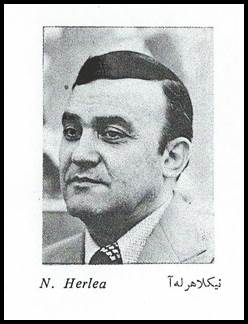
Nicolae Herlea in an undated photo at Tehran Opera House, 1974
(Courtesy Liliana Osses Adams)
Liliana Osses Adams
In Memoriam
Nicolae Herlea (1927 - 2014) at Roudaki Hall Opera House in Tehran, Iran
The opera world has lost another great operatic baritone, amongst the greatest.
Nicolae Herlea, the internationally renowned Romanian opera and concert singer, born on August 28, 1927, in Bucharest, has died on February 24, 2014, in Frankfurt, Germany, aged 86, surrounded by his wife Simona and their two sons.
The quoted document below, released by the Romanian Culture Minister, expresses regret over his death:
“Whoever had at least one chance to meet the artist was for sure impressed with his exceptional modesty, which only characterizes such persons for whom reaching an ideal does not represent an aim in itself, but the spiritual fulfillment of the most noble belief in beauty, good and honour. He always showed an immense respect for art and for the artists. This is, in a few words, who the great lyrics artist Nicolae Herlea was (…) Beyond the awards that, from a young age, have paved his way to world fame, perhaps the main path he followed in his strive for perfection was represented by his own hard work for achieving artistic mastery, for adding technical polish to his voice, about which he confessed he felt it was ‘a gift from God.’ Out of respect for this gift he received, and also fully aware of the message entrusted to him and loving his vocation of lyric performer, the maestro has managed to climb with an impressive rapidity to stairway to global success,” concluded the document.
Widely recognized as “Italianate baritone” and applauded for his admirable mastery, he dazzled audiences with his bel canto singing of Rossini’s Figaro, the role which he performed over 550 times during his long career of a half-century.
Forty years ago, in 1974, Nicolae Herlea made his guest appearance at Roudaki Hall in Tehran as Figaro, a barber and a servant (factotum), who does everything in Rossini’s comic masterpiece.

Nicolae Herlea in an undated photo at Tehran Opera House, 1974
(Courtesy Liliana Osses Adams)
During the 1973-74 season, Roudaki Hall presented fourteen operas, including double-casts of principal roles in Rossini’s The Barber of Seville: Rouhangeez Yaschmi as Rosina and Enayat Rezai as Figaro (December 1973), and Luciana Serra as Rosina and Nicolae Herlea as Figaro (February 1974). It was the revival from the 1968 Enayat Rezai’s original new production with Pari Samar as Rosina and Enayat Rezai as Figaro.
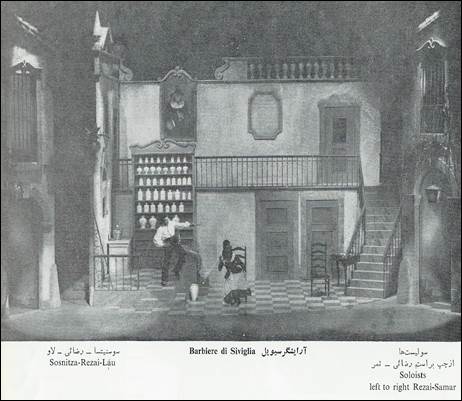
Gioacchino Rossini’s Il Barbiere di Siviglia at Roudaki Hall Opera House, Tehran, 1968
Pari Samar as Rosina and Enayat Rezai as Figaro
Conducted by Heinz Sosnitza, directed by Enayat Rezai and in set designed by Theo Lau
The poster by Sadegh Barirani, an Iranian graphic designer, announced the performances of Rossini’s Barber of Seville in April 1970 directed by Enayat Rezai with Rouhangeez Yaschmi as Rosina and Enayat Rezai as Figaro.
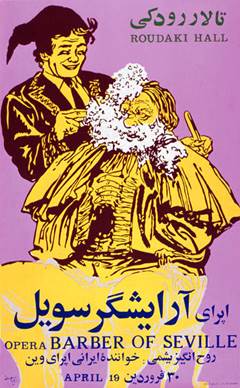
Rossini’s Barber of Seville at Roudaki Hall, April 1970
Source: © Sadegh Barirani Official Website
Updated with some nice and attractive touches, the repeated 1973-74 performances of Rossini’s opera, under the baton of Maestro Manrico de Tura, in stage direction by Enayat Rezai and with sets and costumes designed by Theo Lau and Helen Enscha, were sung respectively by Rouhangeez Yaschmi/ Enayat Rezai, and Luciana Serra/Nicolae Herlea as Rosina and Figaro.
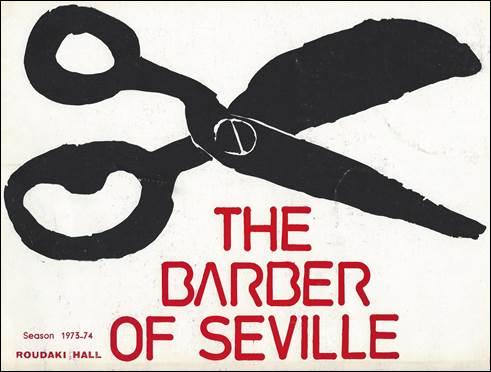
Program cover page: Rossini’s The Barber of Seville, Tehran Roudaki Hall, 1973-74
(Courtesy Liliana Osses Adams collection)
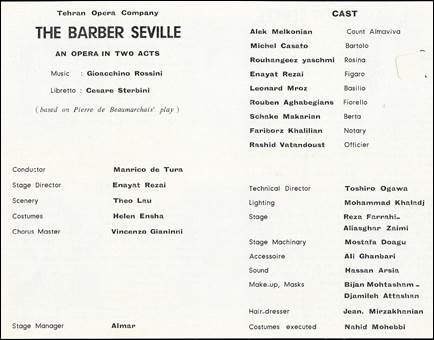
Cast list for Rossini’s The Barber of Seville at Roudaki Hall, December, 1973
Rouhangeez Yaschmi and Enayat Rezai in the leading roles.
(Courtesy Liliana Osses Adams collection)
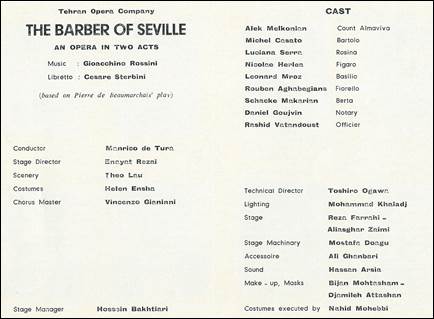
Cast list for Rossini’s The Barber of Seville at Roudaki Hall, February, 1974
Luciana Serra and Nicolae Herlea in the leading roles.
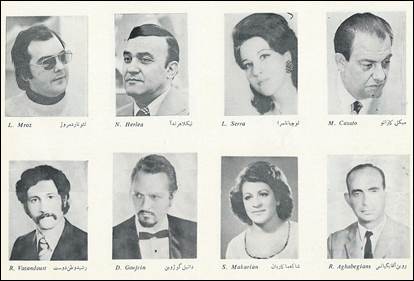
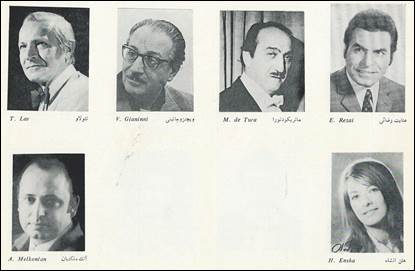
Artist photos for Rossini’s The Barber of Seville, Tehran Opera House, 1973-74 season
(Courtesy Liliana Osses collection)
In the following years, Rossini’s Barber of Seville was not included in the repertory at Roudaki Hall.
And Nicolae Herlea, who amazed us with his bravura rendition of Figaro in Il Barbiere (which is often called the first true baritone role), did not return to Tehran.
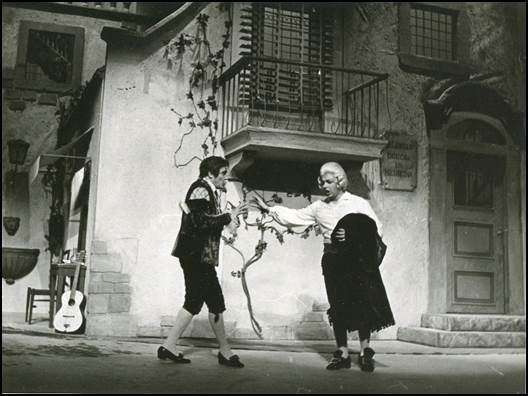
Nicolai Herlea as Rossini’s Figaro and Alek Melkonian as Almaviva at Tehran Opera House, 1974
(Photo courtesy Enayat Rezai through the Fotoatelier Theodor Schuster, Germany)
The most respected and beloved Romanian artist, who collected accolades from the major opera houses in the world, he will be remembered for the pure power and beauty of his voice in his many lyric and dramatic performances, also as Verdi great villains in the verismo style.
Rest in Peace Master.
© Liliana Osses Adams
California, March 2014
Listen to Nicolae Herlea “Largo al factotum“, the Figaro’s cavatina he sang for audition at the Conservatory of Music in Bucharest, where he began voice studies under Professor Aurel Costescu-Duca, himself an outstanding Romanian opera singer and actor.
http://www.youtube.com/watch?v=flcZZCClR04